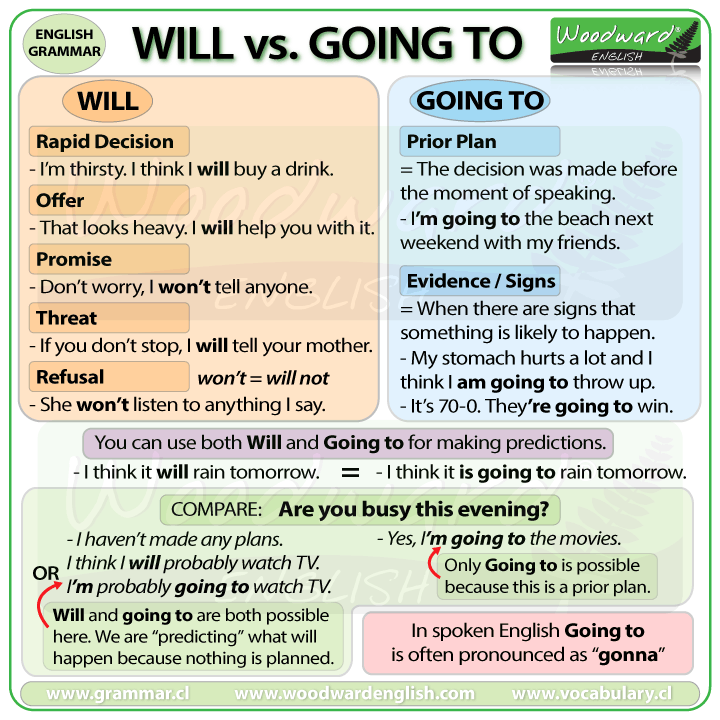Both refer to the future and there is a slight difference between the two though in most cases they can be used interchangeably with no difference in meaning. Even if you misuse them, a native speaker is going to understand you without any problems.
Quick Summary Chart

When to use GOING TO
The structure BE GOING TO is normally used to indicate the future but with some type of connection to the present. We use it in the following situations:
1. When we have already decided or we INTEND to do something in the future. (Prior Plan)
The decision has been made before the moment of speaking.
- They're going to retire to the beach - in fact they have already bought a little beach house.
- I'm going to accept the job offer.
2. When there are definite signs that something is going to happen. (Evidence)
Something is likely to happen based on the evidence or experience you have.
- I think it is going to rain - I just felt a drop.
- I don't feel well. I think I'm going to throw up. (throw up = vomit)
3. When something is about to happen:
- Get back! The bomb is going to explode.
In other cases, where there is no implicit or explicit connection to the present, use WILL:
1. For things that we decide to do now. (Rapid Decisions)
This is when you make a decision at that moment, in a spontaneous way.
- I'll buy one for you too.
- I think I'll try one of those. (I just decided this right now)
2. When we think or believe something about the future. (Prediction)
- My team will not win the league this season.
- I think it will rain later so take an umbrella with you.
Note: You can use both Will and Going to for making future predictions.
3. To make an offer, a promise or a threat.
- I'll give you a discount if you buy it right now.
- I promise I will behave next time.
- I'll take you to the movies if you'd like.
4. You use WON'T when someone refuses to do something.
- I told him to take out the trash but he won't do it.
- My kids won't listen to anything I say.
- My car won't start.
Compare Will vs. Going To
If someone asks: "Are you busy this evening?"
If I respond: "Yes, I'm going to the movies." I use going to because it is a plan I made earlier (before I was asked the question). - In this case we cannot use Will.
If I haven't made plans, then you can say either: "I will probably watch TV." OR "I'm probably going to watch TV."
Both will and going to are possible in this situation because we are predicting what will happen (since we haven't made any plans).
EXERCISES:
1-Grammar: Complete the sentences with the correct form of "will or going to"
‘Will’ or ‘be going to’?
Put in ‘will’ or ‘be going to’:
1. A: We don’t have any bread.
B: I know. I __________________ get some from the shop.
2. A: We don’t have any bread.
B: Really? I __________________ get some from the shop then.
3. A: Why do you need to borrow my suitcase?
B: I __________________ visit my mother in Scotland next month.
4. A: I’m really cold.
B: I __________________ turn the heating on.
5. A: Are you going to John’s party tonight?
B: Yes. Are you going too? I __________________ give you a lift.
6. A: What are your plans after you leave university?
B: I __________________ work in a hospital in Africa. I leave on the 28th
.
7. (The phone rings)
A: I __________________ get it!
8. A: Are you ready to order?
B: I can’t decide … Okay, I __________________ have the steak, please.
9. A: Are you busy tonight? Would you like to have coffee?
B: Sorry. I __________________ go to the library. I’ve been planning to study
all day.
10. A: Why are you carrying a hammer?
B: I __________________ put up some pictures.



No comments:
Post a Comment